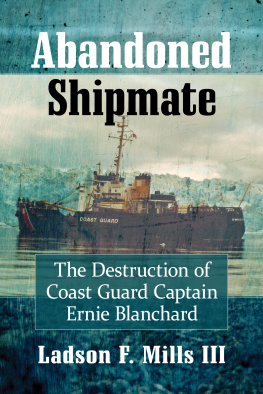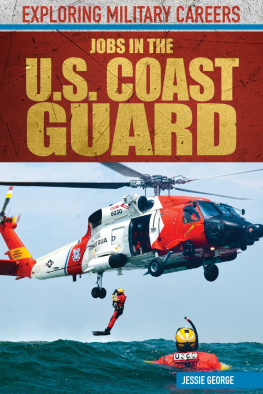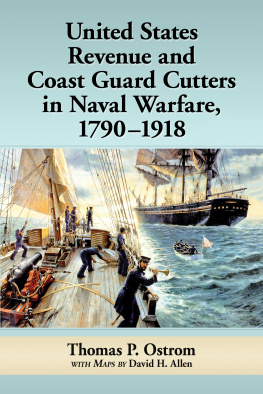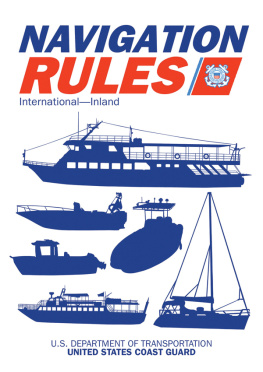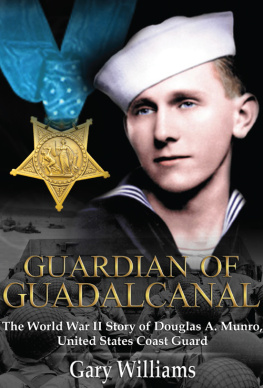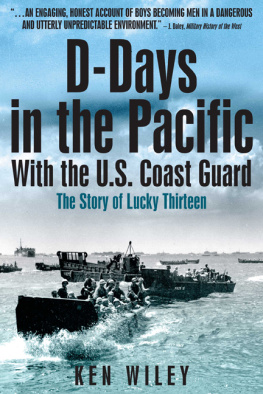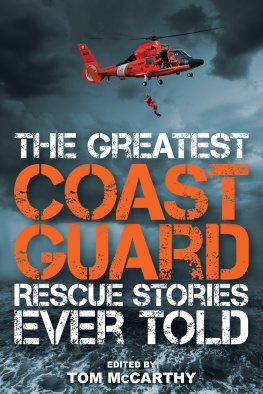
Abandoned Shipmate
The Destruction of Coast Guard Captain Ernie Blanchard
LADSON F. MILLS III

McFarland & Company, Inc., Publishers
Jefferson, North Carolina
LIBRARY OF CONGRESS CATALOGUING DATA ARE AVAILABLE
BRITISH LIBRARY CATALOGUING DATA ARE AVAILABLE
e-ISBN: 978-1-4766-3442-5
2019 Ladson F. Mills III. All rights reserved
No part of this book may be reproduced or transmitted in any form or by any means, electronic or mechanical, including photocopying or recording, or by any information storage and retrieval system, without permission in writing from the publisher.
The front cover image is of the cutter Sweetbrier working buoys in Alaska (courtesy of Rich Allison)
McFarland & Company, Inc., Publishers
Box 611, Jefferson, North Carolina 28640
www.mcfarlandpub.com
For Pam, Suzanne, Josh, Nicole, Connie,
and in grateful memory of Captain Ernest J. Blanchard,
United States Coast Guard, Dot Watson Blanchard
and CWO-4 Ernest J. Blanchard III, United States Navy (Ret.)
Acknowledgments
True love is about sacrifice for the sake of the ones you love.Francis Chen
Like the old saying, many hands make light work, this work has been significantly lightened by the help and support of so very many. It has been over two decades since I first read the article about Ernie Blanchard. Twenty years since I felt an unease that there was something about this story that did not seem right.
Having spent four years as a U.S. Navy officer assigned to the Coast Guard, I am aware that, like all organizations, it is far from perfect. But there was something about this story that bothered me; something I could not let go. After over five years of intensive research, it bothers me even more.
Retiring and having time on my hands motivated my decision to dig deeper into the story, and I begin searching for Ernies family. In what seemed longer than Christmas Eve to an eager child, I will never forget Ernies sister Pam Fitzgeralds first words when she answered my call: We prayed that someday you would come.
It is hard to write a book that is critical of an organization you respect. To borrow from Barney Greenwald, a character from Herman Wouks The Caine Mutiny, it is not my contention that the Coast Guard is not honorable, only that it stood silent and allowed a bad thing to happen. As a result, an innocent man died feeling that he had been abandoned by the organization he loved and had faithfully served for most of his life. But it was more than Ernie alone. His family had been abandoned as well.
Along with my journey, I discovered there are two Coast Guards. One is the public face, brave and reassuring. But the private Coast Guard can be an exacting and unyielding mistress. Many who spoke with me fear their identity will be discovered. As one playfully asserted, I know where you live. Despite these concerns, I owe a debt of gratitude to those who placed principles above fear and chose to help.
Gathering facts is never easy, and became even more challenging by those who refused to answer questions concerning their role in this story. I made a promise, at least to those who would speak to me, that I would print their story exactly as it was told. But I was candid: this did not mean that I would not include other perspectives. Most chose not to speak, citing the passage of time or painful memories. One attempted to intimidate me, which served only to increase my suspicion and resolve.
But then I discovered the crew of the cutter Sweetbrier (WLB-405), The Rose of the Fleet, where Ernie served as Commanding Officer from 1981 to 1984. Thank you, Steve Gray, for putting me in touch with so many members of the crew. And thanks to all of you who so enthusiastically shared your stories of Captain Ernie. Great crews make great captains, and you guys are the greatest!
My appreciation and most profound respect goes to Professor Kingsley Browne of Wayne State University for his numerous articles and especially his 2007 work on military gender issues in The Duke Journal of Gender Law and Policy. And to Karl Vick whose 1995 Washington Post article brought Ernies story to the public eye. It was a story that demanded to be told, and now it requires examination.
I would like to thank my good friend and local author and historian Paul Porwall for his encouragement and help in sorting through the publication process. And to Dr. Jonathan Davidson, and his four-legged friend Sammi, who during our morning beach walks was always encouraging and supportive. I am grateful both as a veteran and father of an Iraq and Afghanistan War veteran for Jonathans psychiatric expertise in serving as a member of the militarys commission to address increasing military suicides.
Thank you to my external editor Dr. Jan Adams who provided expertise and needed criticism. And her patience in convincing me of my errors when I proved to be not nearly as precise as I had hoped to be.
And, as always, to my inside editor and beautiful wife Melisa, who patiently read, re-read, re-re- well you get the picture and overlooked my overly dramatic artistic moments; and all too often my preoccupation which bordered on obsession; and who always loving understood the importance of my task.
And especially my heartfelt thank you to the family of Ernie Blanchard, who allowed me the privilege of intruding on their grief to share the story of an exceptional man and his extraordinary family. This book would not be possible without their cooperation, support, trust, and patience. The Blanchard family is the personification of what makes America great. They will always hold a special place in my heart.
Preface
There is nothing so powerful as the truth and nothing as strangeDaniel Webster
Captain Ernie Blanchard left for work on January 10, 1995, on top of the world. He was a success in his career and loved his life. His personal beliefs seemed perfectly aligned with the institution he served, the United States Coast Guard.
By days end his career was finished, and he was on a path that would end his life.
TimeMagazine labeled it A Political Suicide. Mike Gelles, who performed the psychological autopsy, would admit that of the hundred-plus he had conducted, This one really bothered me. Washington Post columnist Karl Vick would write, Whether it was suicide by political correctness or homicide by political correctness depends on your point of view. What no one disputes is that it resulted from a catastrophic breakdown of rationality.
This narrative examines the turmoil that has engulfed Americas Armed Forces gender inclusion struggles since the decade of the 1980s. Pivotal to understanding the complexity is the story of Coast Guard Captain Ernest J. Blanchard IV. In 1995 while serving as official spokesman and public face of the Coast Guard he made a speech to his alma mater, the Coast Guard Academy.
A gifted and much sought-after speaker, Blanchard had accepted an invitation to address a cadet company experiencing a high level of turmoil. Attempting to lighten the atmosphere through humor, he opened his talk using time-tested jokes that he had regularly incorporated into his speeches. On this occasion, however, the reception proved to be far different from what he anticipated. His humor was criticized as inappropriate and constituting sexual harassment, as well as being racially insensitive. He wrote a letter to the attendees apologizing for any offense he may have committed.
Next page
